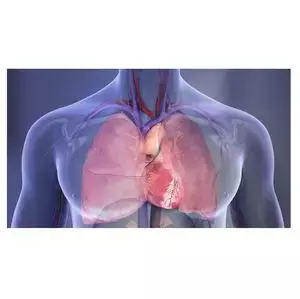- Home
- Medical news & Guidelines
- Anesthesiology
- Cardiology and CTVS
- Critical Care
- Dentistry
- Dermatology
- Diabetes and Endocrinology
- ENT
- Gastroenterology
- Medicine
- Nephrology
- Neurology
- Obstretics-Gynaecology
- Oncology
- Ophthalmology
- Orthopaedics
- Pediatrics-Neonatology
- Psychiatry
- Pulmonology
- Radiology
- Surgery
- Urology
- Laboratory Medicine
- Diet
- Nursing
- Paramedical
- Physiotherapy
- Health news
- Fact Check
- Bone Health Fact Check
- Brain Health Fact Check
- Cancer Related Fact Check
- Child Care Fact Check
- Dental and oral health fact check
- Diabetes and metabolic health fact check
- Diet and Nutrition Fact Check
- Eye and ENT Care Fact Check
- Fitness fact check
- Gut health fact check
- Heart health fact check
- Kidney health fact check
- Medical education fact check
- Men's health fact check
- Respiratory fact check
- Skin and hair care fact check
- Vaccine and Immunization fact check
- Women's health fact check
- AYUSH
- State News
- Andaman and Nicobar Islands
- Andhra Pradesh
- Arunachal Pradesh
- Assam
- Bihar
- Chandigarh
- Chattisgarh
- Dadra and Nagar Haveli
- Daman and Diu
- Delhi
- Goa
- Gujarat
- Haryana
- Himachal Pradesh
- Jammu & Kashmir
- Jharkhand
- Karnataka
- Kerala
- Ladakh
- Lakshadweep
- Madhya Pradesh
- Maharashtra
- Manipur
- Meghalaya
- Mizoram
- Nagaland
- Odisha
- Puducherry
- Punjab
- Rajasthan
- Sikkim
- Tamil Nadu
- Telangana
- Tripura
- Uttar Pradesh
- Uttrakhand
- West Bengal
- Medical Education
- Industry
Antifibrotic therapy reduces mortality and acute exacerbation in idiopathic pulmonary fibrosis: Chest

Antifibrotic treatment appears to reduce the risk of all-cause mortality and acute exacerbation in idiopathic pulmonary fibrosis, according to recently published study results in Chest journal.
(IPF) is a progressive fibrosing interstitial lung disease associated with significant morbidity and mortality. Nintedanib and pirfenidone are two antifibrotic medications currently approved for slowing the rate of lung function decline in IPF, but information on treatment effect on mortality and risk of acute exacerbation (AE) remains limited or unknown.
With this limited background, researchers undertook the study to evaluate whether antifibrotic treatment decrease risk of mortality and AE. The study was designed as a comprehensive search of several databases, including Ovid MEDLINE(R), Ovid Embase, Ovid Cochrane Central Register of Controlled Trials, Ovid Cochrane Database of Systematic Reviews, and Scopus, was conducted. Studies were included if they were original articles comparing mortality or AE events in IPF patients with and without antifibrotic treatment.
Results revealed some key facts.
- A total of 12,956 patients across 26 studies (8 randomized controlled trials and 18 cohort studies) were included in the meta-analysis.
- Antifibrotic treatment was associated with decreased risk of all-cause mortality with a pooled RR 0.55 (95% CI, 0.45-0.66) and I2 of 82%.
- This effect was consistent across additional subgroup analyses, including stratification by study type, risk of bias, duration of follow-up, and antifibrotic subtype.
- Antifibrotic treatment also reduced the risk of AE, with a pooled RR of 0.63 (95% CI, 0.53-0.76), and I2 of 0%.
- Effect on AE risk was consistent across subgroup analyses by study type and for nintedanib but not for pirfenidone.
"There was a decreased risk of mortality associated with antifibrotic therapy (RR, 0.55). There was also an associated decrease in risk for acute exacerbation with antifibrotic therapy (0.63). The latter was more consistent in patients who received nintedanib versus pirfenidone.This is an important meta-analysis and systematic review, which reveals improvement in mortality and risk of acute exacerbation in patients with IPF receiving antifibrotic therapy. Despite greater heterogeneity with pooled analysis, its effect was robust in subgroup analyses by study type, duration of follow-up, and antifibrotic subtype."the team concluded.
For full article follow the link: https://doi.org/10.1016/j.chest.2021.06.049
Source: Chest
Dr Satabdi Saha (BDS, MDS) is a practicing pediatric dentist with a keen interest in new medical researches and updates. She has completed her BDS from North Bengal Dental College ,Darjeeling. Then she went on to secure an ALL INDIA NEET PG rank and completed her MDS from the first dental college in the country – Dr R. Ahmed Dental College and Hospital. She is currently attached to The Marwari Relief Society Hospital as a consultant along with private practice of 2 years. She has published scientific papers in national and international journals. Her strong passion of sharing knowledge with the medical fraternity has motivated her to be a part of Medical Dialogues.
Dr Kamal Kant Kohli-MBBS, DTCD- a chest specialist with more than 30 years of practice and a flair for writing clinical articles, Dr Kamal Kant Kohli joined Medical Dialogues as a Chief Editor of Medical News. Besides writing articles, as an editor, he proofreads and verifies all the medical content published on Medical Dialogues including those coming from journals, studies,medical conferences,guidelines etc. Email: drkohli@medicaldialogues.in. Contact no. 011-43720751


